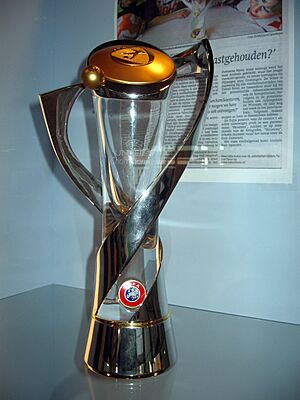UEFA European Under-21 Championship facts for kids
 |
|
| Organising body | UEFA |
|---|---|
| Founded | 1978 |
| Region | Europe |
| Number of teams | 54 (total) 16 (finals) |
| Current champions | |
| Most successful team(s) | (5 titles each) |
The UEFA European Under-21 Championship, also known as the Euro Under-21, is a big football competition in Europe. It happens every two years. Young male players, aged 21 and under, from different European countries compete in this tournament.
Since 1992, this competition has also been super important because it helps teams qualify for the Summer Olympics football tournament.
Italy and Spain are the most successful teams. They have both won the championship five times! England are the current champions. They won their fourth title by beating Germany 3–2 in extra time in the 2025 final.
Contents
History of the Tournament
The Euro Under-21 tournament started in its current form in 1978. Before that, there was a similar competition called the Under-23 Challenge Cup, which ran from 1967 to 1970. Bulgaria won the very first Challenge Cup in 1967.
A proper Under-23 Championship began in 1972. Teams played in groups, and the winners went on to play in quarter-finals, semi-finals, and a final. These matches were played home and away.
In 1976, the age limit for players was changed to 21. This is why it's now called the Under-21 Championship. Even though it's for players "under 21," some players might be 23 by the time the final tournament happens. This is because they must be 21 or younger when the qualification games start. For example, to play in the 2027 tournament, players must have been born in 2004 or later.
A big change happened in 1992. The Under-21 Championship became the official way for European teams to qualify for the Olympic football tournament.
The most people ever to watch an Under-21 match was 44,338. This happened during the 2023 tournament when host country Georgia played Israel.
How the Tournament Works
In the past, the tournament format changed a few times. At first, only eight teams made it to the final stages. They would play home and away matches until a winner was found.
Later, a host country was chosen for the semi-finals and final matches. This meant those games were played in one place.
Over the years, more and more countries wanted to join. So, the number of teams in the final tournament grew. In 1998, there were 46 teams trying to qualify!
For the 2000 tournament, they introduced a group stage in the finals. This is similar to how bigger tournaments work today. Teams played in small groups, and the best teams from those groups moved on to the semi-finals and then the final.
In 2017, the tournament expanded to include twelve teams in the finals. Then, on February 6, 2019, UEFA decided to increase the number of teams even more. Starting from the 2021 tournament, sixteen teams now compete in the finals.
The tournament also switched to being held in odd-numbered years (like 2007, 2009, etc.). This was done so that the best young players could stay with their Under-21 teams longer. It stopped them from being moved to the senior national team too early.
Tournament Winners
| Edition | Year | Hosts | Final Match | Teams that reached the semi-finals (or played for third place) |
Number of teams | ||||||
|---|---|---|---|---|---|---|---|---|---|---|---|
| Winners | Score | Runners-up | |||||||||
| 1 | 1978 | Home-and-away basis | Yugoslavia |
1–0 / 4–4 5–4 on aggregate |
East Germany |
8 | |||||
| 2 | 1980 | Home-and-away basis | Soviet Union |
0–0 / 1–0 1–0 on aggregate |
East Germany |
8 | |||||
| 3 | 1982 | Home-and-away basis | England |
3–1 / 2–3 5–4 on aggregate |
West Germany |
8 | |||||
| 4 | 1984 | Home-and-away basis | England |
1–0 / 2–0 3–0 on aggregate |
Spain |
8 | |||||
| 5 | 1986 | Home-and-away basis | Spain |
1–2 / 2–1 3–3 on aggregate (3–0 p) |
Italy |
8 | |||||
| 6 | 1988 | Home-and-away basis | France |
0–0 / 3–0 3–0 on aggregate |
Greece |
8 | |||||
| 7 | 1990 | Home-and-away basis | Soviet Union |
4–2 / 3–1 7–3 on aggregate |
Yugoslavia |
8 | |||||
| 8 | 1992 | Home-and-away basis | Italy |
2–0 / 0–1 2–1 on aggregate |
Sweden |
8 | |||||
| 9 | 1994 | Italy |
1–0 (aet) |
Portugal |
Spain |
2–1 | France |
8 | |||
| 10 | 1996 | Italy |
1–1 (4–2 p) |
Spain |
France |
1–0 | Scotland |
8 | |||
| 11 | 1998 | Spain |
1–0 | Greece |
Norway |
2–0 | Netherlands |
8 | |||
| 12 | 2000 | Italy |
2–1 | Czech Republic |
Spain |
1–0 | Slovakia |
8 | |||
| 13 | 2002 | Czech Republic |
0–0 (3–1 p) |
France |
8 | ||||||
| 14 | 2004 | Italy |
3–0 | Serbia and Montenegro |
Portugal |
3–2 (aet) |
Sweden |
8 | |||
| 15 | 2006 | Netherlands |
3–0 | Ukraine |
8 | ||||||
| 16 | 2007 | Netherlands |
4–1 | Serbia |
8 | ||||||
| 17 | 2009 | Germany |
4–0 | England |
8 | ||||||
| 18 | 2011 | Spain |
2–0 | Switzerland |
Belarus |
1–0 | Czech Republic |
8 | |||
| 19 | 2013 | Spain |
4–2 | Italy |
8 | ||||||
| 20 | 2015 | Sweden |
0–0 (4–3 p) |
Portugal |
8 | ||||||
| 21 | 2017 | Germany |
1–0 | Spain |
12 | ||||||
| 22 | 2019 | Spain |
2–1 | Germany |
12 | ||||||
| 23 | 2021 | Germany |
1–0 | Portugal |
16 | ||||||
| 24 | 2023 | England |
1–0 | Spain |
16 | ||||||
| 25 | 2025 | England |
3–2 (aet) |
Germany |
16 | ||||||
| 26 | 2027 | 16 | |||||||||
Top Teams in the Tournament
This table shows which countries have won, been runners-up (second place), or finished third in the UEFA European Under-21 Championship.
| Team | Winners | Runners-up | Third place |
|---|---|---|---|
| 5 (1986, 1998, 2011, 2013, 2019) | 4 (1984, 1996, 2017, 2023) | 2 (1994, 2000) | |
| 5 (1992, 1994, 1996, 2000, 2004) | 2 (1986, 2013) | ||
| 4 (1982, 1984, 2023, 2025) | 1 (2009) | ||
| 3 (2009, 2017, 2021) | 3 (1982, 2019, 2025) | ||
| 2 (1980, 1990) | |||
| 2 (2006, 2007) | |||
| 1 (1978) | 3 (1990, 2004, 2007) | ||
| 1 (1988) | 1 (2002) | 1 (1996) | |
| 1 (2002) | 1 (2000) | ||
| 1 (2015) | 1 (1992) | ||
| 3 (1994, 2015, 2021) | 1 (2004) | ||
| 2 (1978, 1980) | |||
| 2 (1988, 1998) | |||
| 1 (2006) | |||
| 1 (2011) | |||
| 1 (1998) | |||
| 1 (2011) |
Awards for Players
Best Player of the Tournament
This award goes to the player who performs the best throughout the tournament. It used to be called the Golden Player award. Since 2013, a special team from UEFA picks the winner.
| Year | Golden Player | Ref. |
|---|---|---|
| 1978 | ||
| 1980 | ||
| 1982 | ||
| 1984 | ||
| 1986 | ||
| 1988 | ||
| 1990 | ||
| 1992 | ||
| 1994 | ||
| 1996 | ||
| 1998 | ||
| 2000 | ||
| 2002 | ||
| 2004 | ||
| 2006 | ||
| 2007 | ||
| 2009 | ||
| 2011 | ||
| 2013 | ||
| 2015 | ||
| 2017 | ||
| 2019 | ||
| 2021 | ||
| 2023 | ||
| 2025 |
Top Goal Scorer
This award, once called the Golden Boot, is given to the player who scores the most goals in the tournament. Since 2013, the second and third highest scorers also get awards called the Silver Boot and Bronze Boot.
| Year | First place | Goals | Second place | Goals | Third place | Goals | Ref. |
|---|---|---|---|---|---|---|---|
| 2000 | 3 | ||||||
| 2002 | 3 | ||||||
| 2004 | 4 | ||||||
| 2006 | 4 | ||||||
| 2007 | 4 | ||||||
| 2009 | 7 | ||||||
| 2011 | 5 | ||||||
| 2013 | 4 | 3 | 3 | ||||
| 2015 | 3 | 2 | 2 | ||||
| 2017 | 5 | 3 | 3 | ||||
| 2019 | 7 | 4 | 3 | ||||
| 2021 | 4 | 3 | 3 | ||||
| 2023 | 3 | ||||||
| 2025 | 6 |
All-Time Best Under-21 Team
On June 17, 2015, UEFA announced a "dream team" of the best players from all the past Under-21 tournaments.
| Goalkeeper | Defenders | Midfielders | Forwards |
|---|---|---|---|
See also
 In Spanish: Campeonato de Europa de la UEFA Sub-21 para niños
In Spanish: Campeonato de Europa de la UEFA Sub-21 para niños
- UEFA European Championship
- UEFA European Under-19 Championship
- UEFA European Under-17 Championship
 | George Robert Carruthers |
 | Patricia Bath |
 | Jan Ernst Matzeliger |
 | Alexander Miles |


